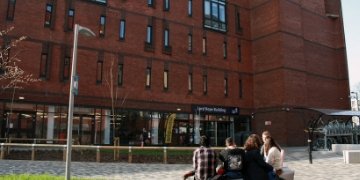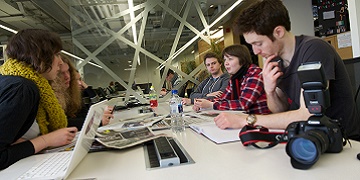As well as carrying out ground-breaking research into a range of media topics, we also offer undergraduate and postgraduate courses in journalism where our students work with internationally-recognised academics and highly experienced journalists.
Undergraduate study
BA in Journalism, Media & Communication
The media industry now is as diverse and exciting as it has ever been, and offers tremendous opportunities for fun, successful and diverse careers.
This popular and established subject can be studied as joint degree with another subject. You can combine it with English, History, French, Spanish, Economics, Education, Human Resource Management, Law, Social Work and Social Policy, Psychology and Politics.
Read more about the BA in Journalism, Media & Communication with English or the complete list of Journalism, Media & Communication courses
Postgraduate study
Our taught graduate programme combine academic excellence in journalism studies with professional education to industry standards.
We offer a taught Masters degree in:
MSc Digital Journalism
This course will equip you with the skills to produce multimedia news and features. You’ll develop sound analytical, ethical and entrepreneurial skills in order to perform at a high level in the digital media world.
Find out further information on MSc Digital Journalism.
MSc Media & Communication
The course will provide media and communication professionals with an informed and critical perspective on the future of communications, and future researchers and academics will gain advanced skills in media and communications.
It draws on the expertise of Strathclyde’s internationally-renowned media and communications academic staff, including experts in strategic communication, media and communication theory, media ethics, gender and the media, and mediated populism.
Find out further information on MSc Media & Communication.
MSc Applied Gender Studies
The MSc Applied Gender Studies degree at Strathclyde is a Masters-level course for those who wish to study how gender ‘works’ in relation to other structural inequalities such as race, sexuality, class and disability within society.
If you wish to pursue a career in the charitable, education, government or civil service or the heritage sectors then this course is ideally suited to you. It will also appeal to those who may already be working within an organisation with a strong interest in gender in society.
Find our further information on MSc Applied Gender Studies.
PhD Study
We have a thriving, friendly PhD community and offer considerable experience in doctoral supervision across Journalism, Media and Communications. We welcome new applicants, particularly within our four key research themes: Gender, Race & Sexuality; Science, Health & Environment; Politics, Publics & Activism; Violence & Conflict.
Recent and current PhD projects supervised by colleagues in Journalism, Media and Communication studies include: gender and politics in the Scottish public sphere; fandom, media and gender in Scottish women’s football; social media and political activism in Nigeria; self-branding and new forms of masculinity in online spaces; smartphones, experience and cyborgian identity; #MeToo in English and French fictions; rape discourse on social media; body positivity empowerment on Instagram in the UK and Turkey; Popular Storytelling to Reduce Plastic Waste: Behavioural Change, Sustainability and Young People; Healthy Reusables? Challenges and Opportunities in NHS settings; Communicating (Micro)plastics: Science and media myths in a changing landscape; Plastic pollution, digital communications and behaviour change amongst low-income communities in Indonesia.
We have extensive experience of both cross-disciplinary and cross-institutional supervision, including in relation to histories and practices of feminist activism, and have co-supervised practice-based projects in Creative Writing and Film.
Find a supervisor in Journalism, Media & Communication.
Research
Research in Journalism, Media & Communication at Strathclyde is focused on contemporary media practices and representations, with a particular emphasis on social media. There are four key areas which define Journalism, Media and Communication Research at Strathclyde: Gender & Media; Science, Health & Environment; Politics, Publics & Activism; Violence & Conflict.
We have specific strengths in working with external partners – locally, nationally and internationally – in a diverse range of sectors spanning our interests in politics and government, gender equality and gender-based violence, environmentalism, science and society and public health.
Staff
Find details on Journalism research and academic staff.


